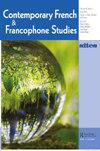From Symbol to Culture: Julia Kristeva’s Fascination with the Chinese Language
IF 0.2
4区 文学
0 LITERATURE, ROMANCE
引用次数: 0
Abstract
Abstract Kristeva has a close relationship with China. Not only has she obtained a degree in Chinese and been active in the “China Period” of Tel Quel, but she has also focused on the Chinese language, thought, and culture in both her academic research and her literary work. Kristeva’s early concern with Chinese primarily revolved around linguistics and semiotics. Influenced by the Chinese language, she proposed theories such as “logique poétique” and “le paragramme semiology.” After the 1970s, Kristeva began to introduce psychoanalytic and feminist perspectives into her research, focusing on understanding the Chinese language from the standpoint of Chinese thought, culture, and historical traditions and considering Chinese as a “tonal language.” Since the 1990s and especially in the 21st century, Kristeva further explored the potential for dialogue between Chinese and European cultures within the context of their “encounter.” Thus, Kristeva’s fascination with the Chinese language has become a prominent case of Western practice in the mutual learning between Chinese and Western literary theories.从符号到文化朱莉娅-克里斯蒂娃对中文的迷恋
摘要 克里斯蒂娃与中国有着密切的关系。她不仅获得了中文学位,活跃在泰尔奎尔的 "中国时期",而且在学术研究和文学创作中都关注中国的语言、思想和文化。克里斯蒂娃早期对中文的关注主要围绕语言学和符号学。受汉语的影响,她提出了 "诗的逻辑"(logique poétique)和 "符号学范式"(le paragramme semiology)等理论。20 世纪 70 年代后,克里斯蒂娃开始在研究中引入精神分析和女性主义视角,注重从中国思想、文化和历史传统的角度理解汉语,将汉语视为一种 "音调语言"。20 世纪 90 年代以来,尤其是 21 世纪以来,克里斯蒂娃在中欧文化 "相遇 "的背景下,进一步探索中欧文化对话的可能性。因此,克里斯蒂娃对汉语的迷恋成为中西文学理论相互借鉴的一个突出的西方实践案例。
本文章由计算机程序翻译,如有差异,请以英文原文为准。
求助全文
约1分钟内获得全文
求助全文
来源期刊

Contemporary French and Francophone Studies
LITERATURE, ROMANCE-
CiteScore
0.30
自引率
0.00%
发文量
43
期刊介绍:
An established journal of reference inviting all critical approaches on the latest debates and issues in the field, Contemporary French & Francophone Studies (formerly known as SITES) provides a forum not only for academics, but for novelists, poets, artists, journalists, and filmmakers as well. In addition to its focus on French and Francophone studies, one of the journal"s primary objectives is to reflect the interdisciplinary direction taken by the field and by the humanities and the arts in general. CF&FS is published five times per year, with four issues devoted to particular themes, and a fifth issue, “The Open Issue” welcoming non-thematic contributions.
 求助内容:
求助内容: 应助结果提醒方式:
应助结果提醒方式:


